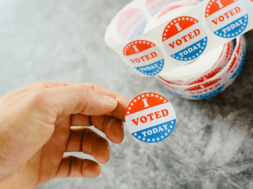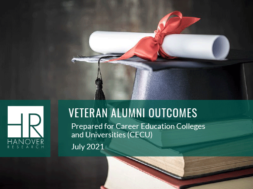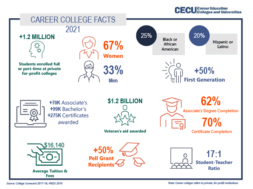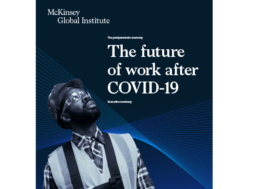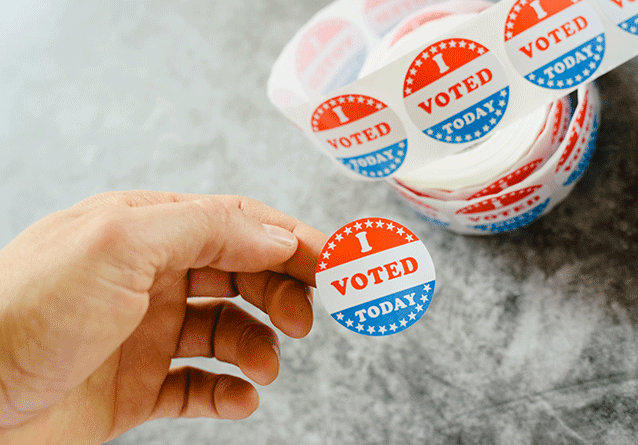
Trends and Opportunities from the 2020 General Election
Written from a presentation given at the CECU CEO Summit by Bruce Mehlman, Mehlman Castagnetti Rosen & Thomas
The 2020 election was one of several extraordinary events this year that is likely to be more accelerative than transformative, said the founder of a bipartisan government relations firm.
Bruce Mehlman of Mehlman Castagnetti Rosen & Thomas said we turned to various institutions we belonged to, to help us make sense of a changing world in the 20th century. But we’ve lost trust in so many of these institutions in the 21st century that politics has been disrupted.
“At the end of the day, the reason … there is so much disruption in politics is that for many Americans the institutions, the policies, the parties of the last century are not protecting them against the realities of this century,” he said.
Mehlman said he is excited that many Americans care and are speaking out, whether by tweeting, marching or voting. But while people are engaged, they’re not sharing facts or reality. For example, the Pew Polling Center asked people if they thought the U.S. government did everything it could to contain COVID-19. About 90% of those who watched Fox News or listened to talk radio said yes, but only 3% of those who watched only MSNBC, CNN or National Public Radio agreed.
That’s because we’ve lost the voice of the referees, Mehlman said, and one of those referees was Walter Cronkite, who served as anchorman for the CBS Evening News for 19 years and who was often cited “as the most trusted man in America.”
“American families would watch the news at dinnertime and try to understand what happened in Vietnam, what happened with Watergate,” Mehlman said. “We would go into elections with a shared set of facts and understanding.”
But these days the media is less likely to inform than to affirm, he said.
“If you’re right of center, you watch Fox News. If you’re left of center, you watch MSNBC or CNN. You no longer see the other party as the loyal opposition; you see them as a threat to your way of life.”
As a result, when people vote it is now based upon a different perception of what reality is, Mehlman said.
But there is a stark reality based on your wealth. In prior years, the top earning 25% and the bottom earning 25% both shared the impact of any recession, he said. But now, the highest earning 25% are doing fine in both the stock market and their incomes, whereas the lowest earning 25% are getting hammered financially.
“The real social injustice that I see now is that Americans of color are more likely to catch COVID and they’re more likely to die from it,” Mehlman said. “They’re (also) less likely to have retained their jobs in the crisis.”
In short, the pandemic has become a matter of politics.
“Half the nation is wearing masks astounded by the ignorance of those in MAGA hats who refuse,” Mehlman said. “The other half of the nation is wearing MAGA hats (and) they’re astounded by the arrogance of those wearing masks who think everyone can just choose to work from home.”
Not surprisingly, that battle impacted the election and can be seen by several trends, including the continuation of hyper-activism.
“Just as the midterm turnouts of 2018 were the highest since 1914, the turnout this year in the presidential election of eligible voters … was the highest since the year 1900,” Mehlman said. “It wasn’t just voting with your vote, it was also voting with your checkbook. This election crushed all prior records in how much money was spent, both at the presidential level and the Congressional level.”
Secondly, people were feeling so disrupted that they decided to pick the less chaotic president, but in the House they decided to push for the less aggressive, less revolutionary agenda, he said.
“This is the 31st presidential election since the year 1900. Of those 31 years with elections, 11 of the years also had a recession, nine had Supreme Court vacancies, eight saw sustained mass protests across multiple cities and in six of them we were at war,” Mehlman said. But only twice have two super-disruptive events happened during election years, and those were when Franklin D. Roosevelt and Barack Obama won in landslides.
“But this year we had four of them,” Mehlman said. And as a result, people voted to change who is in the White House.
“Normally when we hire a president to clean up a giant mess — and all of those events tell me we have a giant mess, whether it’s the economy, whether it’s the pandemic, whether it is concerns about policing — you give the president a lot of coattails to help do the job,” Mehlman said. “Normally you give large Senate majorities, or House majorities or governorships.” But there was almost nothing down ballot supporting the vote for Joe Biden.
Mehlman said one of the reasons Democrats were smart to pick Biden was because nobody believes he is a socialist. But people were worried about some of the rising factions in the Democratic Party — those who argue we should defund the police or decriminalize the border – and it led many people to put a check on Biden by voting for a Republican in the House.
Pending the two run-off elections in Georgia, Biden is likely to be the first Democrat to become president without also having the Democratic Party control the Senate since 1884.
“That’s a big challenge because on day one, to get all of your people confirmed, it’s a negotiation, to say nothing of your broader agenda,” he said.
Still, Mehlman believes things can get done.
“The top three leaders — Joe Biden, Mitch McConnell and Nancy Pelosi — are dealmakers,” he said. “That’s what they’ve done their whole careers and combined they’ve got more than a century of working together.”
The nation will need deals in areas like COVID and the economy. And if they do nothing, the Republican majority in the Senate and the Democratic majority in the House will be at risk in the 2022 midterms, particularly in states like Pennsylvania, Wisconsin, Florida, Arizona, Iowa and North Carolina, he said.
“That all said, Joe Biden may be the best and the right man for this job in this time,” Mehlman said. “He’s far more of a legislator than an executive. He doesn’t bring a big ideological set of beliefs. Biden believes in the institution; he believes that Republicans can be negotiated with and that you can work with Republicans to cut deals.”
Finally, Biden is a transitional figure, he said.
“He’s not the future of the Democratic Party,” Mehlman said. “But he’s the responsible adult to whom we’ve given the keys during the COVID crisis. Hopefully, he can build … toward the kind of bipartisan governance the nation needs.”
Despite the many challenges facing the nation, Mehlman is optimistic by the explosion of innovation that 2020 has brought, as well as in the new ways people are connecting. Both make learning so much more accessible, which makes health so much more attainable, he said.
“Whether it’s an alternative to a four-year college, or alternatives to going to see your doctor… we’re going to find alternatives that make us more resilient, but that also give us more options and more flexibility to be better prepared for pandemics, to be better ready to mitigate and adapt to climate change.”
In the meantime, we need to build our infrastructures smarter and better. Mehlman said the big challenge of the decade will be decreasing the U.S.-China friction and decoupling.
“Vice President Biden may turn the Twitter volume down so it will be more traditional diplomatic negotiation and less policy by tweet,” he said. “While he may look to cooperate with the Chinese on climate, he’s going to confront them more on human rights. This is the defining geopolitical challenge.”
But it’s not necessarily bad if the forces change around the world. “A lot of the multilateral institutions were built for the Cold War for a Soviet Union that doesn’t exist anymore,” Mehlman said. “If we can reinvent them in ways that aim at the West confronting China in a more effective way, with the nations of the world dealing with pandemics or climate in a more effective way, that’s a good thing.”
We’re also seeing the parties reinvent who they are, in part through education.
“When I graduated college, if you had a college degree you were 4% more likely to be a Republican. Today, you are 20% more likely to be a Democrat. When you ask women which party they would rather see control Congress, in the year 2010 it was Democrats plus 6, and in 2019 it was Democrats plus 22.”
In addition, the rural-urban divide has grown.
Political scientist Dave Wasserman observed that urban counties tend to have Whole Food Markets, and rural counties tend to have Cracker Barrel stores, Mehlman said.
“He took a look at Democrat’s winning percentage in counties with Whole Foods, which is large and growing, and he contrasted it with the Democrat’s winning percentage in counties with Cracker Barrels, where it’s small and falling. He found when Bill Clinton won the first time there was a 20 point rural-urban gap. It went up to 25 the next election and it’s grown every election since.” It’s currently estimated at about 57%.
Finally, we’re seeing the gap in who the parties elect to represent them, he said.
“In 1961, 95% of House Republicans and 93% of House Democrats were both white and male. These days the Democratic Party looks a lot more like America as a whole,” Mehlman said.
Meanwhile, the Republican Party is still about 90% both white and male, although it will drop into the 80% range due to a historic number of women elected into the Republican House this year, he said.
“You’re not going to be able to represent the whole country if they don’t see you as representative of them,” Mehlman said. “I think for anyone to succeed, whether it’s a business or … a politician, you need to have all of your consumers, all of your stakeholders perceive that you know who they are and you appreciate where they’re going.”
Mehlman also sees a change in philosophy going forward. “Before COVID, there was a focus on efficiency just in time,” he said. “These days it is about resilience just in case.”
That means that governments may fund stockpiles or excess capacity and that businesses may look to diversify supply chains out of China.
“We’re rethinking how our offices, how our beauty salons, how so many places that we have people gather, how they operate and how often people are in them,” he said. “The drive for greater independence is giving way to a drive for greater self-sufficiency. It’s no longer just the defense industrial base, it’s also 5G. It’s also technology. We’re seeing businesses think a little bit less about global integration and more about vertical integration to control their own supply chain.”
And while many people can’t wait to get back their offices, a lot of those changes are going to stick in larger ways, Mehlman said.
“The huge appetite for leverage and risk has given way to a focus on margin and safety,” he said. “After 9/11, there were new laws on transportation security and cargo security. With the financial collapse, there were new rules about banking and systemic risk. We’re clearly about to face new health and new pandemic preparedness regulations. We’re reexamining our safety nets. There are new liability risks that businesses have to be worried about. They have to put new safety procedures in place.”
Mehlman said we’re never going to succeed unless we can find ways to expand opportunities and create more chances for more people to feel dealt in. If we don’t, those people will keep voting for change.
“They’re going to keep swinging us back and forth between populists and ultra-progressives and make it very difficult for businesses to have long-term plans that they can stick to,” he said.
Mehlman acknowledged that he was worried months ago about the election, but his worries ended up having no merit as there was no foreign interference, no evidence of systemic fraud, no polling place violence, and despite a pandemic, record voter turnout.
“For me, it really hit home on Election Day,” he said. “It occurred to me that our democracy really is great and strong … because of those little old, blue-haired ladies and men who every two years show up to do their democratic duty.”
If anyone should have been afraid of the virus, it should have been the elderly poll workers. “Yet they strapped on their face shield, they put on their masks and they were making our system work,” Mehlman said. “It gives me hope and confidence that we are going to find a way to make the kind of reforms that deal more Americans in. Politics can be ugly. But at the end of the day, I wouldn’t trade our system for any others.”
BRUCE MEHLMAN, with over two decades of experience in public policy, business and law, Bruce Mehlman helps leaders and organizations understand, anticipate and navigate political risk, as well as speaks on policy and political trends at conferences and on TV networks.
Founder of Mehlman Castagnetti Rosen & Thomas, a bipartisan government relations firm, Mehlman served as Assistant Secretary of Commerce for Technology Policy under President George W. Bush. He also worked as a senior leadership aide in the House of Representatives, general counsel to a national political party committee and policy counsel to Cisco Systems.
He earned a bachelor’s degree from Princeton University and a doctorate from the University of Virginia Law School where he served on the Virginia Law Review.
Contact Information: Bruce Mehlman, Founder // Mehlman Castagnetti Rosen & Thomas // 1341 G St. NW, Unit 1100 // Washington, DC 20005 // bruce@mc-dc.com
